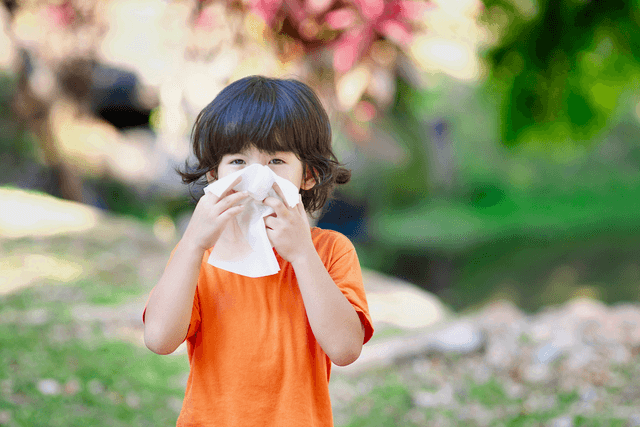
Table of Contents
Seasonal Allergies In Kids
Spring is officially here. If your child is one of the millions of people with seasonal allergies, you’re probably pretty familiar with the sneezing, congestion and runny nose that comes along with nature beginning to bloom. However, if in between the usual allergy symptoms, your child wakes up with a sore jaw, it can be a little confusing. Can allergies cause jaw pain? Or is it a sign that something else is going on? Well, we have answers! In this post, our Brooklyn pediatric dentists will be going over the link between allergies and jaw pain.
Sinuses, Teeth and Jaws
The sinuses are a system of hollow, air-filled cavities that connect to the nose. They’re found in the skull and facial bones. Normally, aside from a thin layer of protective mucus, your child’s sinuses are empty.
However, when seasonal allergies strike, the sinuses can become inflamed and swollen. Since they take up a good amount of real estate in the face, when this happens, it often causes facial pain and pressure.
Because the maxillary sinuses are located right above the upper back teeth, close to the ear and temporomandibular joint (TMJ), inflammation and pressure from a sinus infection, cold or allergies can make your teeth hurt and cause jaw and ear pain.
Other Reasons for Jaw Pain With Allergies
Sinus pressure in the teeth and jaw isn’t the only reason why kids might have jaw pain with allergies. Jaw pain can also be caused by:
Mouth Breathing
When the nose is congested, kids are forced to breathe through their mouth. Congestion typically gets worse at night when a child is lying down, so they might even engage in mouth breathing for the entire time they’re asleep. Holding the mouth open for a long stretch like that puts strain on the TMJ and facial muscles. This can cause jaw pain and fatigue.
Teeth Grinding
A study published in the American Journal of Orthodontics found nocturnal bruxism (teeth grinding during sleep) was much more common in kids with allergies compared to non-allergic children. The researchers hypothesized that when the Eustachian tubes in the ears swell because of allergies, teeth grinding is a reflexive response to the change in pressure in the tympanic cavities (small, air-filled spaces in the middle ear). Excessive or chronic teeth grinding in kids is a culprit behind tooth and jaw pain.
Overuse
Overuse is another potential reason why allergies can cause jaw pain in some children. The chewing muscles and TMJ work together to help kids open and close their mouth. Constant coughing and sneezing can overtax the muscles and joints, leading to tension and a sore jaw.
How to Tell if it’s Allergies, TMJ Dysfunction
or Another Dental Concern?
If your child’s jaw pain began not long after their seasonal allergies kicked in and they’re congested, the discomfort is likely related to their allergies. In these cases, no treatment is necessary. Once the allergies and sinus inflammation go away, the pain will disappear too.
Allergies and TMJ disorders do share a number of symptoms in common, including jaw pain, headaches, facial pain and ear aches. However, with a TMJ disorder, pain will usually be more persistent, severe and accompanied by other symptoms, such as limited mobility in the jaw, stiffness, and popping or clicking noises. If your child’s jaw pain is severe or they still have it after their congestion resolves, it’s a good idea to talk with your pediatric dentist.
Other dental concerns, such as a cavity, are generally felt in one tooth, while sinus pressure is felt in several of the upper back teeth. A really deep cavity can cause referred pain in your child’s jaw and other teeth, but unlike an allergy-related ache, it will continue even after their allergies are under control.
Connect With a Brooklyn Pediatric Dentist
If you’re concerned about your child’s jaw pain, whether they have allergies or not, schedule a visit at Bitesize Pediatric Dentistry. Our expert kids’ dentists will get to the bottom of your child’s discomfort and help them find relief.






